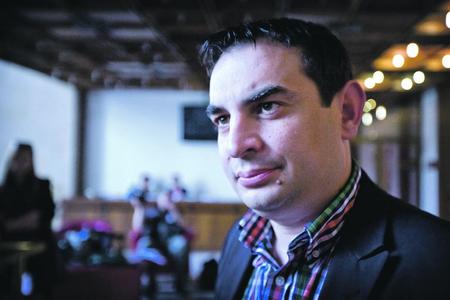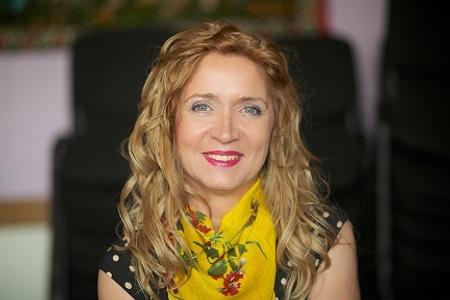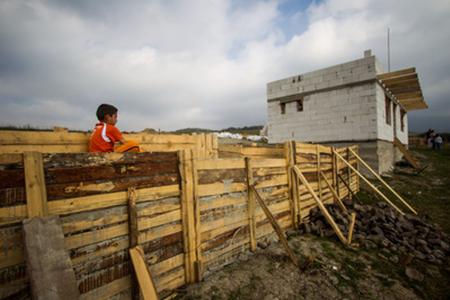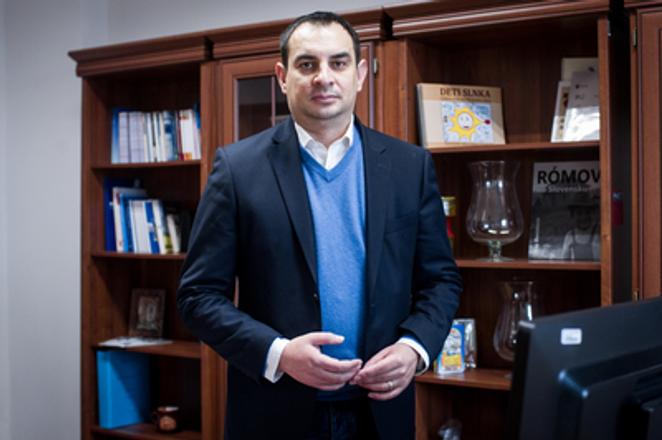He was presented as the first truly reform-oriented government proxy for Roma communities, but Peter Pollák lost support of human rights professionals only few days after he took office in October 2012. Three years later even his boss, Interior Minister Robert Kaliňák, has criticised him for being too slow.
“Communication with ministers of former government was very bad during my last year in the office; some of them were ignoring me,” Pollák told the press. “This work needs political support.”
Based on the new coalition agreement, Most-Híd installed a new person into the office on April 6, political analyst Ábel Ravasz of the Matej Bell Institute.

However, the main question is not who will take the post after Pollák, according to Laco Oravec, programme director of the Milan Šimečka Foundation.
“The question is if the way or architecture of how government deals with the human rights agenda will change,” Oravec told The Slovak Spectator.
Big plans
Pollák, the first Roma ever to sit in the Slovak parliament, has taken over the job of government proxy for Roma communities at a time when two big anti-Roma rallies made the issue urgent.
Pollák, part of the candidate list of the opposition group Ordinary People and Independent Personalities (OĽaNO), was geared to pursue what he calls the ‘Roma reform’, built around the philosophy that state assistance for individuals should depend on their approach to society, the state and their family.
“If we fail to seriously address the problems within communities, then the dissatisfaction of citizens might grow into more radical expressions and people will express more open sympathies towards extremist movements,” Pollák told the Slovak Spectator in October 2012.

Three years later experts say there has been no visible improvement in segregated Roma settlements. Moreover, extremist People’s Party – Our Slovakia (ĽSNS) made it to the parliament in March general elections.
The Roma reform package was meant to have some 100 provisions which would have been presented gradually in phases. At first, Pollák introduced 10 pillars of the Roma reform package which immediately received criticism from NGO’s working with Roma for their restrictive approach towards welfare.
The reform included a proposal to cut welfare benefits for those unwilling to work and parents unable to keep children from acting out in school.
They were politically motivated and designed to mollify the emotional state of mind of the public, according to Iveta Bihariová of People Against Racism.
“These themes do not aspire to draw the marginalised communities out from a social miasma, but rather to placate public demand,” Bihariová said at the time, as quoted by the TASR newswire. “I even dare to say that this attitude will be doomed to failure right from the beginning.”
Cutting welfare
Most of Roma reform remained on the paper but some of its measures have been introduced in legislation. One of the most criticised changes was the cut in welfare benefits for those unwilling to work.
Since 2014, basic material-need welfare benefits varied from €61.60 to €216.10 per month depending on number and age of household members. Stricter legislation sees it decrease by €61.60 per month for every adult household member able to work who declines to participate in minor works or community service projects organised by the municipality or alternatively volunteer for at least 32 hours per month.
“It seems like some politicians imagine Roma like people who have dozens of job invites but they refuse them on a daily basis,” Jarmila Lajčáková of the Centre for Ethnic and Culture Research (CVEK) told The Slovak Spectator.
Ombudswoman Jana Dubovcová filled motion against the changes however Constitutional Court rejected it in mid 2015.
Launching new projects
Pollák also focused on building of schools, community centres, pre-school education and whole-day education system. He also increased numbers of special pedagogues in schools working with Roma pupils.

Pollák also launched project of legalising lands where Roma settlements are often illegally placed. This problem is 200 years old because in past even state supported creating of settlements in such places. However, only four of 504 problematic localities applied for the program.
One of his biggest successes is that Slovakia succeeded to persuade European Commission to again include Marginalised Roma Communities item into its funding programming period 2014-2020, according to Pollák and NGOs.
NGOs appraised Pollák also for supporting long-term projects which have proved successful. For example, the Healthy Communities project that is built and implemented based on the long-term initiative of the Association of Culture, Education and Communication (ACEC) which started in 2003. The project is aimed at health care field workers who can increase awareness about health issues in marginalized Roma communities.
The problem is that many of government measures targeting Roma were rather marketing-oriented activities often using trial and error methods that were not based on a complex vision or policy, according to Oravec.
“It was more politics doing than reforming,” Oravec said. “We were promised much greater results three years ago.”
Hard times
Several observers pointed out that Pollák was in complicated situation because Prime Minister Robet Fico choose opposition politician to deal with this complicated issue. Moreover, Pollák had to cooperate with Interior Minister Robet Kaliňák which oversees the proxy office.
“On one side you are trying to recall the prime minister and on the other side you have to cooperate with him,” Pollák said in an interview with Sme daily in February 2016.
At the end of 2015 Pollák and Kaliňák started to blame each other for the delayed introduction of legislation concerning lands with illegal Roma buildings and obligatory pre-school education for socially excluded children.
“In this case we gave the opposition possibility to show whether it can be constructive,” Kaliňák told public service RTVS. “From this point of view it has its shortcomings and could be better.”
Later, Pollák openly criticised the new government for lack of solutions to Roma issues in its programme priorities.
New proxy, new system
The new government should deal with the question how to manage human rights agenda which is currently divided in several offices, according to Oravec.
He pointed out that Parliament cancelled the post of deputy prime minister for human rights and national minorities in 2012. Moreover, the government proxy for minorities has weak powers and the post has not been occupied for several years.

“There is a legitimate question whether human rights agenda should not be returned to deputy prime minister or if there shouldn’t be ministry or at least office primarily focusing on ethnic minorities,” Oravec said.
Most-Híd has the right for the post of proxy for Roma communities, but the government is now dealing with the question of whether posts of government proxy for Roma communities and proxy for minorities should be merged, according to Kaliňák’s spokesman Ivan Netík.
When approached by daily Sme, Bugár refused to speak about the issue.
“We are not deciding where this person will be but whether such person will have competencies for this function,” Bugár told the Sme.



 Peter Pollák (source: Sme)
Peter Pollák (source: Sme)